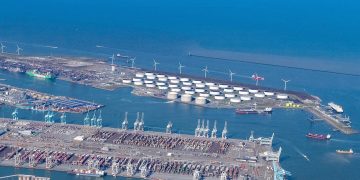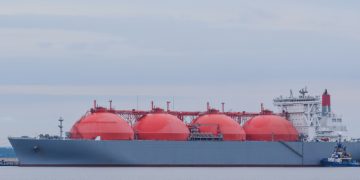In an exclusive interview to SAFETY4SEA, Martha Selwyn who is currently Manager at the United Nations Global Compact and leads work on the social-climate nexus with the Maritime Just Transition Task Force, explains why this initiative represents an unprecedented international collaboration, creating a framework underpinned by social dialogue and stakeholder engagement.
The Maritime Just Transition Task Force was established during COP26 in November 2021, by the International Chamber of Shipping (ICS), the International Transport Workers’ Federation (ITF), the United Nations Global Compact, the International Labour Organization (ILO) and the International Maritime Organization (IMO). It was formed to ensure that shipping’s response to the climate emergency puts seafarers and communities at the heart of the solution. It marks the first sector coming together in a tripartite framework – convening unions, industry, and the relevant UN Bodies – to collectively discuss how to secure a Just Transition for an industry.
SAFETY4SEA: What are the top priorities in your agenda?
Martha Selwyn: Top priorities involve supporting the 1.9 million-strong seafarer workforce to transition to a net zero shipping industry. These priorities are well encompassed by the ‘mapping a just transition for seafarers’ action plan recently launched at COP 27. The priorities can broadly be categorized as follows:
#1 Implementing inclusive just transition principles as global shipping decarbonizes
- Ensuring that Just Transition planning, as part of wider decarbonization plans in the maritime industry, is aligned with globally established labor standards under the Maritime Labour Convention, as amended (MLC, 2006), underpinned by social dialogue and stakeholder engagement.
- Ensuring a people-centred transition critically means ensuring the safety and health of the maritime workforce. There are a number of safety challenges relating to alternative fuels – including hydrogen and ammonia.
- We also need to recognize that for too long – shipping’s workforce has not reflected 50% of the population. A people-centred approach must be inclusive and not just refer to one half of the population. Moving toward to a more diverse workforce also represents a major opportunity for the sector.
#2 Addressing recruitment and attrition
- Support seafaring careers both at sea and ashore, by establishing mobility frameworks for seafarers to develop transferable skills over their time on board, preparing them for a career ashore, beyond seafaring.
- Take active steps to address seafarer attrition, which represents a significant challenge to attract and retain seafarers (including women) for shipping’s green transition.
#3 Equitable training and skills development, including enhanced skills monitoring on national levels
- Strengthening global training standards for seafarers in the ongoing comprehensive review of the IMO STCW Convention and Code, and calls for the identification of areas for revision
- Delivering equitable training models for all seafarers, to ensure they can keep up with technological advances needed to support the industry’s decarbonization and avoid a widening skills and training gap
- Developing national maritime skills councils, as advisory bodies, to complement the STCW training framework, including giving special attention to the additional skills that the maritime workforce will need to handle alternative fuels.
S4S: What are your goals & aspirations with the launch of your new action plan during COP27?
M.S.: To firstly raise awareness of the scale of the challenge and to then trigger subsequent action. The modelling undertaken by DNV – in research commissioned by the Task Force which informed the action plan – cautions that many as 800,000 seafarers will require additional training to handle alternative fuels by the mid-2030s if shipping is to meet the world’s target of keeping global warming to 1.5C or less by 2050.
Secondly to provide a global framework and clear recommendations to policy-makers, Industry and training providers as to how this challenge can be addressed in a way that is just, fair and leaves no seafarer behind. Transitions can result in social challenges e.g. job losses if they are not managed well. In shipping with the action plan, and the platform for social dialogue that has been established through the task force between ITF, ICS and the relevant regulators, there is an opportunity to ensure the transition is well-managed, skills needs are identified in advance, and that the no seafarer is left behind.
S4S: What are the key soft skills that maritime professionals must have for the next decades?
M.S.: According to the DNV report, personal, organizational and management skills will be a prerequisite to exploit the possibilities of future decarbonization-related technology. These include personal skills such as creativity and innovation, as well as other organization skills, including change management, people management and coordinating teams working remotely/dispersed teams. These are further presented in table 8.1 of DNVs report.
S4S: They say that there is a gift/ opportunity in every challenge. Given the challenges that shipping is facing in way of decarbonization, what sort of opportunities do you identify?
M.S.: The green economy also presents new opportunities to attract new workers into the industry and develop new skillsets. Some emerging green industries are already leveraging the green transition in their recruitment strategies. This needs to be grasped to ensure the industry has a competent workforce in place to support its decarbonization. Our action plan identifies one such opportunity: to grow our sector to have a more diverse workforce through the transition. Diversifying the maritime workforce not only supports equity – a key dimension of any Just Transition according to ILO guidelines, it’s also critical to allowing the sector to draw on a wider and deeper talent pool to achieve the green transition.
Our plan champions transition strategies that actively promote inclusion opportunities. Expanding our workforce in a more diverse direction represents a major opportunity for the sector to harness skills of individuals who may not have been considered previously, and those that may themselves not have considered a career in maritime.
This can look like recruiting from a broader range of countries, geographical locations, ethnic backgrounds, genders and ranges of physical ability for the varied roles that do (and will) exist.
On the skills development side of the recruitment challenge, we encourage industry, government and education partners to consider targeted education and training opportunities for these groups.
Strengthening global training standards at pace will ensure a level playing field for all seafarers. Unlike other industries, shipping is unique in having a global training standard, with a global standard-setter in the International Maritime Organization (IMO). The IMO sets training standards through its STCW Convention, which is currently being reviewed to reflect skills needed for the green transition.
S4S: In your recent report, up to 800,000 seafarers will require additional training to meet decarbonization goals. What is your advice to ship operators to develop a sustainable skills strategy for their crew onboard?
M.S.: Collaborate – Given the uncertainties around future fuels and training, collaboration and sharing best practice is important, as are monitoring and anticipating skills needs. The Task Force is suggesting to establish skills councils to fulfil this function. This will help to ensure that the workforce and training institutions can be advised on the quantity of training needed overall and in particular locations. This will help plug national and regional skills gap and support the overall decarbonization of the industry by ensuring a competent workforce and avoiding any delays to the implementation of clean technologies. Ship operators can support and collaborate with such councils, sharing insights and in turn, incorporating them into internal strategies.
Engage -In addition, a sustainable skills strategy as part of wider decarbonization plans should be underpinned in social dialogue – a key principle of just transition. This involves engaging workers in social dialogue around strategies, plan, any other net zero strategy with employment impacts – including in this case a skills strategy.
Investing in skills is also an important aspect. Industry investments should (where relevant) factor in investments towards skills development. In the next few years and while the STCW convention is still being reviewed, it will be particularly important for the Industry, as it relates to additional training for decarbonization, to invest in the reskilling or upskilling of staff according to their roles. Moving forward, industry will also play an important role in delivering and investing in ship-specific training to staff.
S4S: What are the future skills for the next generation of shipping? What should be industry’s top priorities considering maritime decarbonization?
M.S.: In addition to the above-mentioned soft skills, according to the DNV report, increased IT, digital, technical, STEM, and organizational competence will also be needed in future education to meet decarbonization demands, and this will need to be reflected in seafarer education. For instance, understanding fuel specific chemistry and physics; handling more digitalized and manual systems on bridge, deck and engine. These can also be found in the DNV report.
S4S: What is your wish list for the industry and/or regulators and all parties involved for the shipping industry following COP27 discussions?
M.S.: The main roadblock to support seafarer training is a lack of clarity about viability and uptake of alternative fuel options, as well as uncertainty surrounding regulatory developments and financing, is making it difficult to plan effectively for the transition of the maritime workforce and to attract investment towards new skills programs, compatible with the industry’s future needs and decarbonized future.
The Initial IMO GHG strategy is due to be revised at MEPC 80 in July. During this process, particular attention should be given to aligning more explicitly the levels of ambition of the Revised IMO GHG Strategy with the 1.5 C temperature goal of the Paris Agreement. This can help to provide market certainty and in turn stimulate the training investments needed for the maritime workforce, and kickstart the training transition and many of the aspects described above to secure a Just Transition.
S4S: If you could change one thing across the industry from your perspective, what this would be and why?
M.S.: Aligning on trajectories, and raising ambition for a decarbonized shipping industry.
S4S: Do you have any plans/ projects/ initiatives that you would like to share?
M.S.: The Task Force is currently planning its second phase of work which will focus on implementing the action plan. More information on this will be available in early 2023.
S4S: What is your key message to maritime professionals in order to remain up to date with latest developments and achieve a smooth green transition?
M.S.: In the immediate term – following the discussions at MEPC 80 will be important to understand how the shipping industry will approach and ultimately achieve its green transition.
The views presented hereabove are only those of the author and do not necessarily reflect those of SAFETY4SEA and are for information sharing and discussion purposes only.



























































